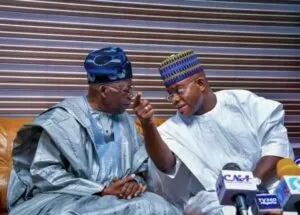Why Yahaya Bello believes the Buhari government is the best in Africa

The Buhari government has been doing more in terms of development than any other African country, according to the governor of Kogi state, Yahaya Bello. He said this while speaking at the 2022 Kogi Development Summit in Lokoja on Tuesday.
The Buhari Government’s Development Agenda
According to the Governor, he said the Buhari government has set out an ambitious development agenda to improve the lives of Nigerians and position the country as a leading force in Africa. The key pillars of the government’s development agenda Yahaya Bello listed are as follows:
1) Improving infrastructure: The Buhari government is investing heavily in upgrading Nigeria’s infrastructure, including roads, railways, airports and power plants. This will help to boost economic growth and create jobs across the country.
2) Growing the economy: The Buhari government is pursuing policies to grow the Nigerian economy, such as reforming the tax system and attracting foreign investment. These measures will help to reduce poverty and create more opportunities for Nigerians.
3) Investing in education: The Buhari government is committed to improving access to quality education for all Nigerians. This includes investing in new schools and universities, as well as providing financial support for students from low-income families.
4) Fighting corruption: The Buhari government is taking steps to tackle corruption at all levels of society. This includes establishing a new anti-corruption commission and passing laws to strengthen asset declaration requirements for public officials.
5) protecting the environment: The Buhari government is working to protect Nigeria’s environment through measures such as planting trees and banning plastic bags. This will help to improve the quality of life for all Nigerians and preserve our natural heritage for future generations.
The successes of the Buhari Government so far
The Buhari government has achieved a lot in its four years in office, with many positive developments taking place across the country. One of the most significant successes of the government has been its efforts to tackle corruption. Under the Buhari administration, corrupt officials have been arrested and jailed, and steps have been taken to recover stolen funds. The government has also made progress in improving the economy, with GDP growth reaching 2.6% in 2018. Additionally, inflation has fallen from 18.7% in 2015 to 11.4% in 2018, and unemployment has declined from 10.4% in 2016 to 8.9% in 2018. The Buhari government has also made significant investments in infrastructure, including constructing new roads, railways, and airports, he said.
Why Yahaya Bello believes the Buhari government is the best in Africa
Yahaya Bello, the governor of Kogi State in Nigeria, has praised the Buhari government for its development record in Africa.
“The Buhari government has done more to develop Nigeria and Africa than any other government in recent history,” Bello said.
He pointed to the construction of roads, railways, and power plants as evidence of the Buhari government’s commitment to development.
“The Buhari government is investing in the future of Nigeria and Africa,” Bello said. “No other government is doing more to improve the lives of ordinary Nigerians.”
Other African governments that are doing well
Conclusion
The Buhari government has been in power for just over four years, and in that time, they have accomplished more development than any other African country. Yahaya Bello, the governor of Kogi state, made this claim in a recent interview. He cites the construction of roads, bridges, and schools as proof of the Buhari government’s commitment to development.
Stay Updated

The Causes of Nigeria’s Economic Woes

Nigeria is the largest economy in Africa. With a GDP of $322.6 billion, Nigeria accounts for about 18% of Africa’s total GDP. The country has a population of roughly 260 million people and is considered one of the fastest-growing economies in the world. Despite its advantageous position, Nigeria faces some serious economic problems that could hurt investors and businesses operating there or consider it as a new market entry point.
Here are the key issues with Nigeria’s economy today, what’s causing them, and what needs to change to improve things moving forward.
Corruption in Nigeria
For many investors, corruption is the first thing that comes to mind when they think about investing in Nigeria. Corruption is a recognized problem in Nigeria, and it creates a huge number of challenges for the country’s economy. First, corruption is an added cost that businesses have to factor into their operations. Second, corruption leads to a lack of transparency in government decision-making, which makes it difficult for businesses to plan for the future. Finally, corruption leads to a lack of trust between businesses and the government.
When businesses don’t trust the government to make decisions fairly, they have no choice but to spend money on lobbying government officials to make sure they get what they want. This is yet another added cost that Nigeria’s businesses have to factor into their operations.
Lack of Transparency and Fairness in Nigeria’s economy
In addition to the added cost of corruption, businesses are also impacted by the lack of transparency and fairness in Nigeria’s economy. Many Nigerian government officials have a vested interest in particular businesses succeeding and operating in the country. This leads to unfair government practices, like giving certain businesses benefits that others don’t receive.
As a result, businesses that don’t receive the same benefits are put at a disadvantage. This makes it difficult for businesses to succeed and make a profit in Nigeria’s economy. In turn, it makes it more difficult for the government to collect taxes from businesses that aren’t doing well. This only makes the government’s financial problems worse.
Limited Infrastructure and Services from the Government
In addition to unfair practices, the government is also limited in its ability to provide infrastructure and services to businesses operating in Nigeria. The government doesn’t have enough money to provide basic services to the general public, let alone businesses. This lack of funding is primarily driven by the government’s inability to collect enough tax revenue.
A major reason for this is the lack of transparency and fairness in the Nigerian economy mentioned above. When government officials are giving certain businesses special benefits, they aren’t generating enough tax revenue from these businesses to cover the costs of providing services. This puts additional strain on the government’s budget and limits its ability to provide basic services, let alone the infrastructure required for businesses to operate effectively.
Over-Regulation of the Nigerian economy
In addition to a lack of transparency and unfair practices, another issue hurting Nigeria’s economy is the over-regulation of the country’s businesses. Over-regulation is when the government places too many restrictions or requirements on businesses. This is yet another way that the government is limiting its ability to generate tax revenue. For example, many businesses in Nigeria are required to have a government-issued license to operate.
This is a fine idea in theory, but when the government is granting these licenses to their friends or relatives, they are over-regulating the economy and putting companies at a disadvantage. When businesses are given a free pass because they are controlled by the government, it is yet another example of how businesses aren’t taxed fairly.
Nigeria’s Youth Employment Problem
Nigeria has a serious youth employment problem. Nearly 60% of the country’s population is under the age of 30, but only 35% of the total workforce is made up of people between the ages of 15 and 34. This means that the country struggles to provide jobs for the majority of its citizens.
As a result, many young people who want to work are unable to find employment. This leads to frustration, anger, and a lack of hope among the country’s youth. It also leads to increased crime, as many young people turn to a life of crime to make a living. In addition, without jobs, many young people can’t afford to get married and start families. This has contributed to a decline in the country’s birth rate, which is problematic because it means the country’s population will shrink over time.
Conclusion
Nigeria has a lot of advantages when it comes to its economy. The country is home to the largest economy in Africa, and it has a young population that is ideal for building a strong workforce.
However, several issues are holding Nigeria back from realizing its full potential. While corruption is a major problem, the government’s inability to provide a reasonable business climate is even more problematic. If the government were more transparent, fairer, and more willing to reduce regulations, it would be easier for businesses to succeed in Nigeria. If these three things were addressed, Nigeria’s economy would be well on its way to recovering from its recent struggles and becoming an even more valuable market for investors and businesses around the world
Recommended Guidelines

Inside MTV EMAs





